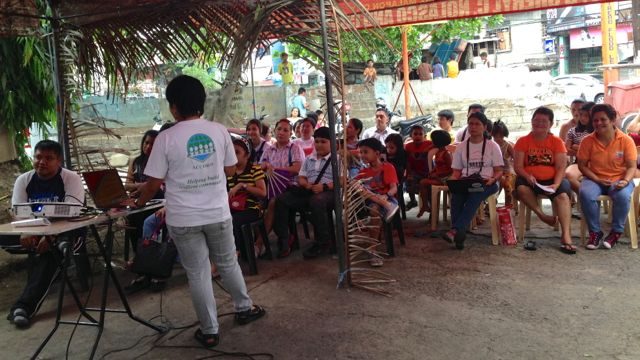SUMMARY
This is AI generated summarization, which may have errors. For context, always refer to the full article.

MANILA, Philippines – It’s a fact of life for the residents of Barangay Potrero in Malabon City: when the rainy season arrives, the floods will follow.
The barangay’s geographical location – close to the heavily silted Tullahan River – explains why it’s so flood-prone, but human activities make it even worse.
“Watch the water when it floods, and you can see piles of garbage floating along,” Potrero resident Mariedel Barbin said.
But when the rainy season comes this year, residents are hoping for a different story. With the help of the non-government organizations ACCORD, Partners for Resilience (PFR), and the Mother Earth Foundation, Potrero’s residents are learning how to properly manage their waste to prevent worsening the flooding they face year after year.
It’s an initiative that comes with an additional incentive: If they learn how to sort their trash, the barangay stands to save millions in landfill tipping fees. Residents can even earn extra cash from the items they sell to junk shops.
“I get around P50 a month for selling used paper, empty bottles and sachets,” Barbin said. “it’s not much, but it adds up.”
She’s now active with the barangay’s activities, going house to house to encourage other residents to do the same.
Managing waste properly
For Earth Day this year, ACCORD and PFR held a solid waste management workshop to some 30 residents of the barangay.
It’s only been a little over a month since the project got started last March, but Barbin said the response has been encouraging, with more than 500 families interested to know more about segregation.

To keep up the interest, households that successfully manage their waste get reward points, which can be exchanged for prizes from barangay officials.
The information drive and door-to-door campaigns are easier because barangay officials themselves are cooperative in wanting to improve flood mitigation measures, according to PRF project director Merdi Jean Arcilla.
But Arcilla added that there’s still the challenge of maintaining residents’ interest in knowing more about the environmental measures.
“We can’t just hold lectures and seminars. That’s why we have these afternoon art workshops, to teach them how to repurpose old household materials in a way that’s fun and interesting,” she said.
It’s also important to make the residents understand how their trash affects them personally, Arcilla added.
In a barangay where most working men are ambulant vendors or construction workers, and women work as household help and sari-sari store owners, money is a significant concern.
The NGOs want the residents to understand just how much money Potrero loses because of the trash they generate, and how much could be saved by managing the waste properly.
Economic impact
Based on a study of the trash Potrero generates, each person of the barangay’s 9,000 households contributes 0.56 kg of trash per day. That also comes out to 19.6 kg of trash per household.
Of these, 60% of the trash is biodegradable, while 15% is recyclable. Residual waste accounts for 15% of the trash, while 0.46% is hazardous waste and 10% is special waste.
This means 75% of the barangay’s trash can either be recycled or turned into compost, instead of being sent to landfills.
Sending the trash to the landfills also costs Potrero millions in tipping fees. The barangay spends P24,192 per day as tipping fee – that’s a total of P8.7 million a year.
But if residents learn to recycle their biodegradable and recyclable trash, the barangay only needs to spend P2.2 million for the residual and special waste, according to the study.
For ACCORD’s Isabelle Baguisi, learning how to segregate trash may not wholly prevent the flooding that affects Potrero every year, but it’s a small step that can make an impact.
“Potrero is a low-lying area that’s vulnerable to flooding. Teaching proper waste management to residents is a small step that empowers them to act on the factors that they can control,” Baguisi said.
Arcilla added, “They can feel that they cannot do much to stop the flooding but by organizing this one aspect of the community, they can actually do much.” – Rappler.com
Add a comment
How does this make you feel?
There are no comments yet. Add your comment to start the conversation.